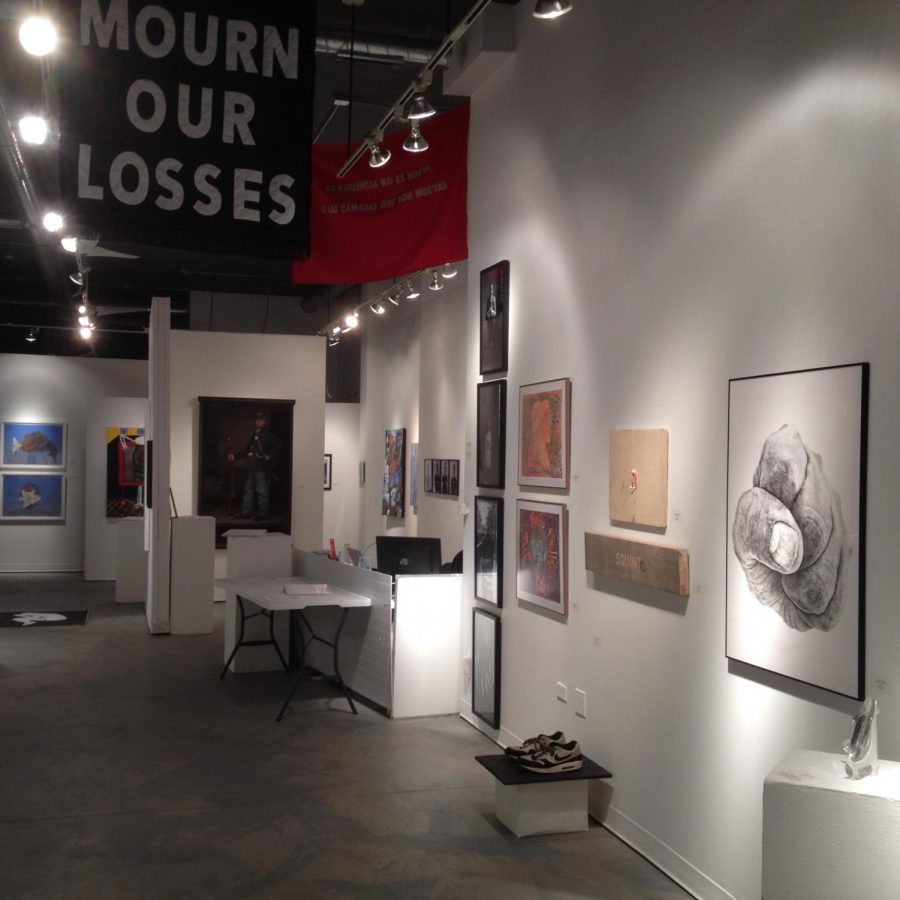Oppression inspires art in new exhibit
“I Can’t Breathe”
December 4, 2015
“I can’t breathe,” were the last words of Eric Garner, who was killed by New York City Police officers on July 17, 2014, and served as a rallying cry adopted by protesters of police brutality. However, the phrase is now the mantra of artists at a Wicker Parkexhibit housed at ARC Gallery, 2156 N. Damen Ave.
According to Cheri Reif Naselli, vice president of ARC Gallery, after seeing growing instances of police brutality and oppression, they decided a show relating to the issue would be poignant and timely.
“We’ve all been watching these incidents pop up on the news, and we always try to do shows that are compelling,” Reif Naselli said. “We played around with what to call it, and came up with ‘I Can’t Breathe,’ and a bunch of people jumped on the bandwagon thinking this was an important issue.”
The show is juried by Mary Pattenand Romi Crawford, who Reif Naselli said have done past work with art dealing with oppression, which was important for ARC to consider when addressing such a hard-pressing issue.
“Mary [Patten] was very interested, but she brought up some concerns,” Reif Naselli said. “She suggested having two jurors, which basically dissipates criticism.”
Reif Naselli then invited Crawford to joinco-juror the show with Patten, because according to Reif Naselli, Crawford is an intelligent scholar and asks hard questions about complicated issues dealing with racism.
Michele Stutts FC, chairwoman of the “I Can’t Breathe” exhibit and longtime ARC member, said the exhibit focuses on police brutality, but it relates to brutality and oppression of all kinds.
“[‘I can’t breathe’] is a very poignant statement, so it is a great title, and it can link many victims of this nature,” Stutts said.
Stutts added that since the gallery’s inception in 1972, the artists who have shown work there have tackled social issues through exhibits. Stutts said it was important to include artists from diverse background and experiences for this show.
Stutts said juried shows typically require artists to pay a submission fee, but ARC Gallery decided to waive the fee for “I Can’t Breathe” so artists who might not have the funds could have their stories included.
“We waived the [$40] fee, so anyone could get in,” Stutts said. “It also encourages those who don’t do traditional arts to be in the show.”
Stutts added that the exhibit houses art from professional artists, but it also includes glass pieces from Project Fire, a program where youth with past traumatic experiences create glass pieces to help cope, and unconventional art such as video games and Spoken Word.
One artist included in the exhibit is Soheila Azadi, whose music video “Witch Hunt,” a collaboration with artist Liz Cambron, focuses on a single subject dressed in a traditional Middle Eastern burka, to signify stigmatization of women.
“We tried to make it funny and critique the way the West view women,” Azadi said. “People who wear [Middle Eastern] veils in the West get stupid questions like ‘Do you shower with your veil on?’ Or ‘Do you sleep with your veil on?’”
Azadi added that oppression of women is a worldwide problem of every religion not just in the East or of Islam.
Islamophobia also played into the short film, said Azadi, who was raised Muslim in Iran. The tradition of veiling is mostly government sanctioned in the East, she said, but in the West, more and more women are finding religious veiling to be a sign of expression and freedom, though it carries negative stereotypes.
“It’s complicated because hijab is forced [in the East] which is oppressive, but there’s a difference between that and hijab in the West, which is by choice and is not oppressive and can actually be liberating,” Azadi said.
She added that some women in the West use hijab as a source of self-expression and a way to say, “This is who I am.”
Azadi added that the film critiques the lack of knowledge about Middle Eastern women, as the subject of the film is wearing traditional Afghani clothing, which stems from a culture the U.S. has been in long conflict with.
“We don’t know anything about Afghanistan, or their women,” Azadi said. “Just watch a documentary or something.”
“I Can’t Breathe” runs through Dec. 19, with a special artists talk with the jurors on Dec. 12 from 4–6 p.m. More information can be found at http://www.ARCGallery.org/I-Cant-Breathe/








